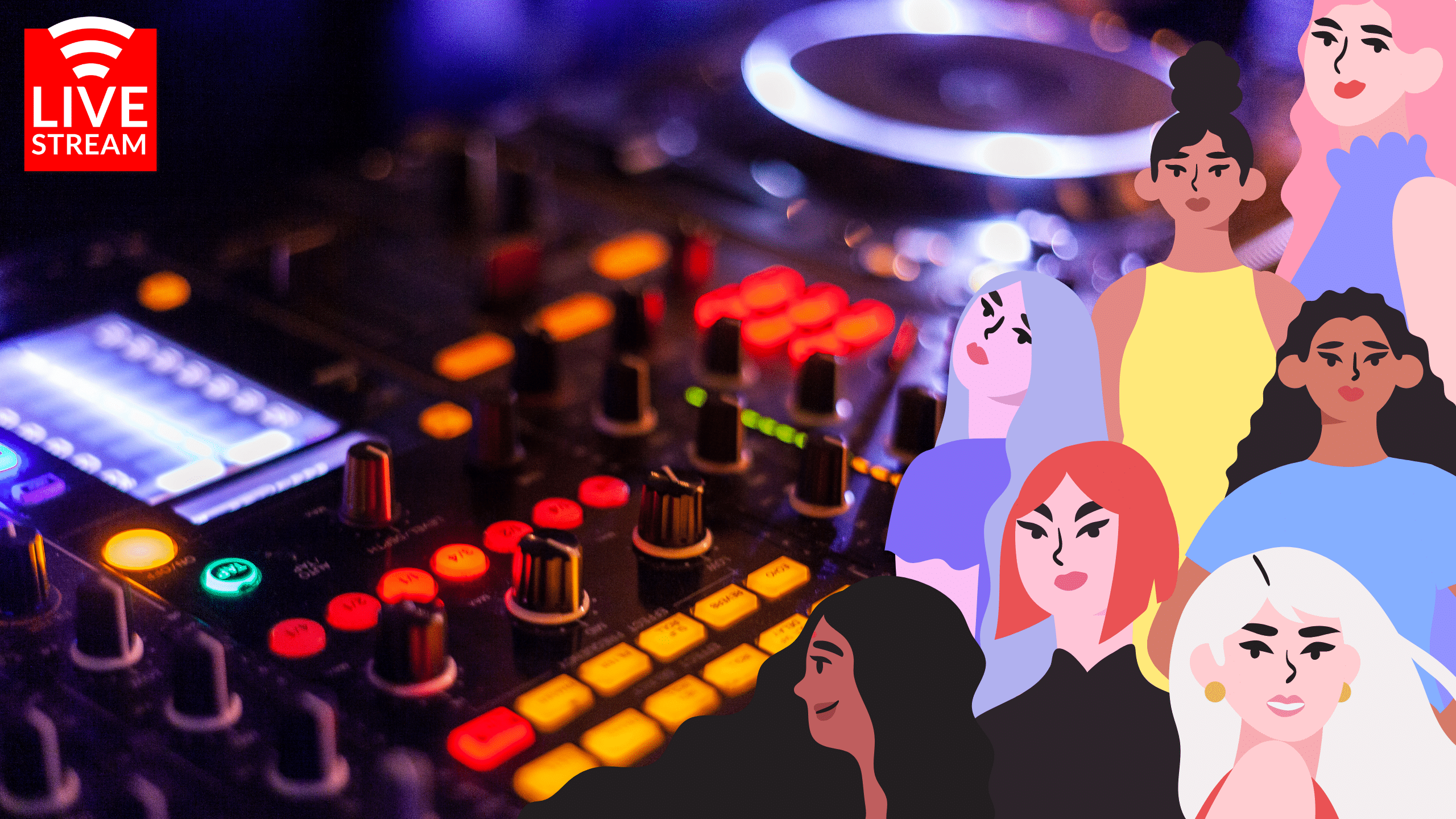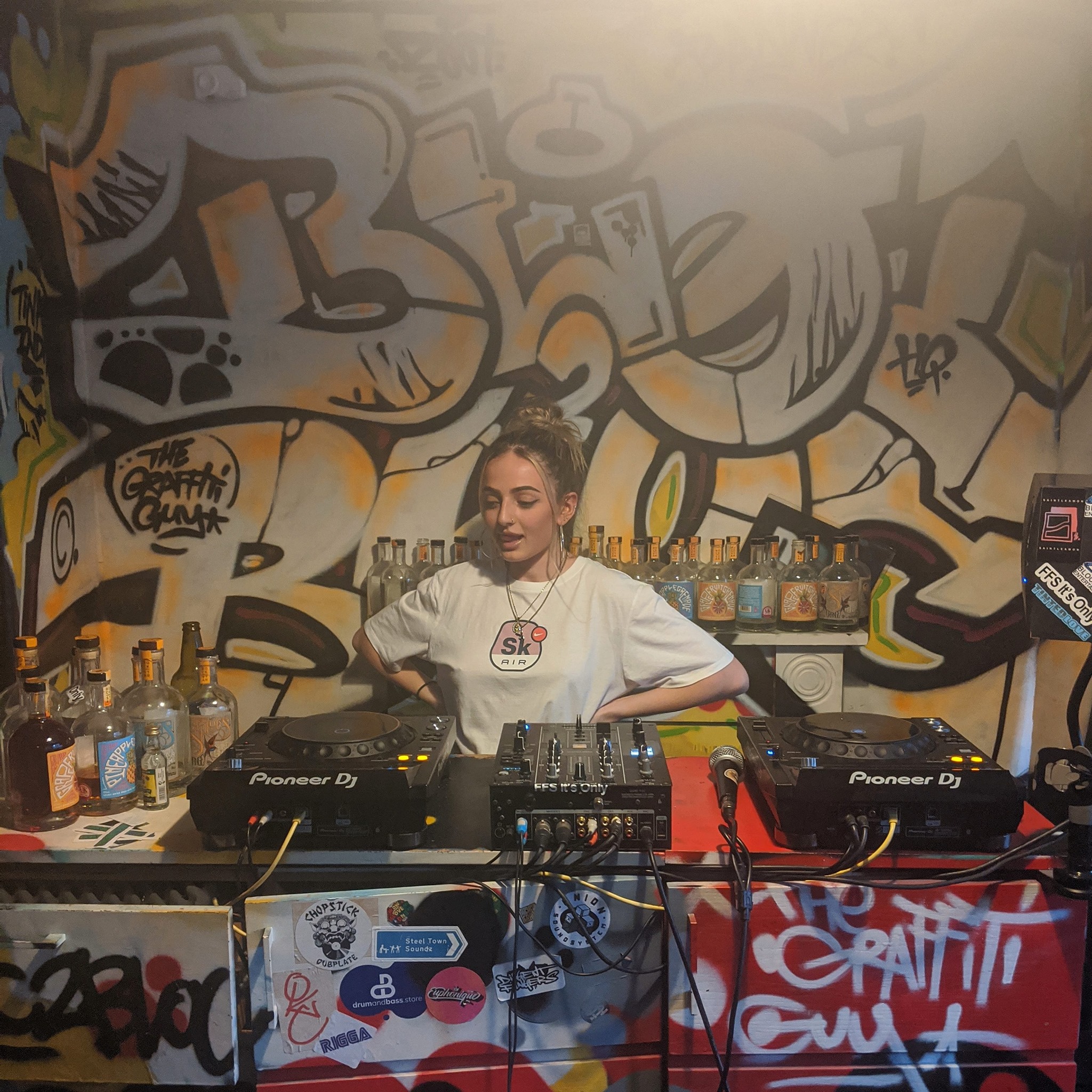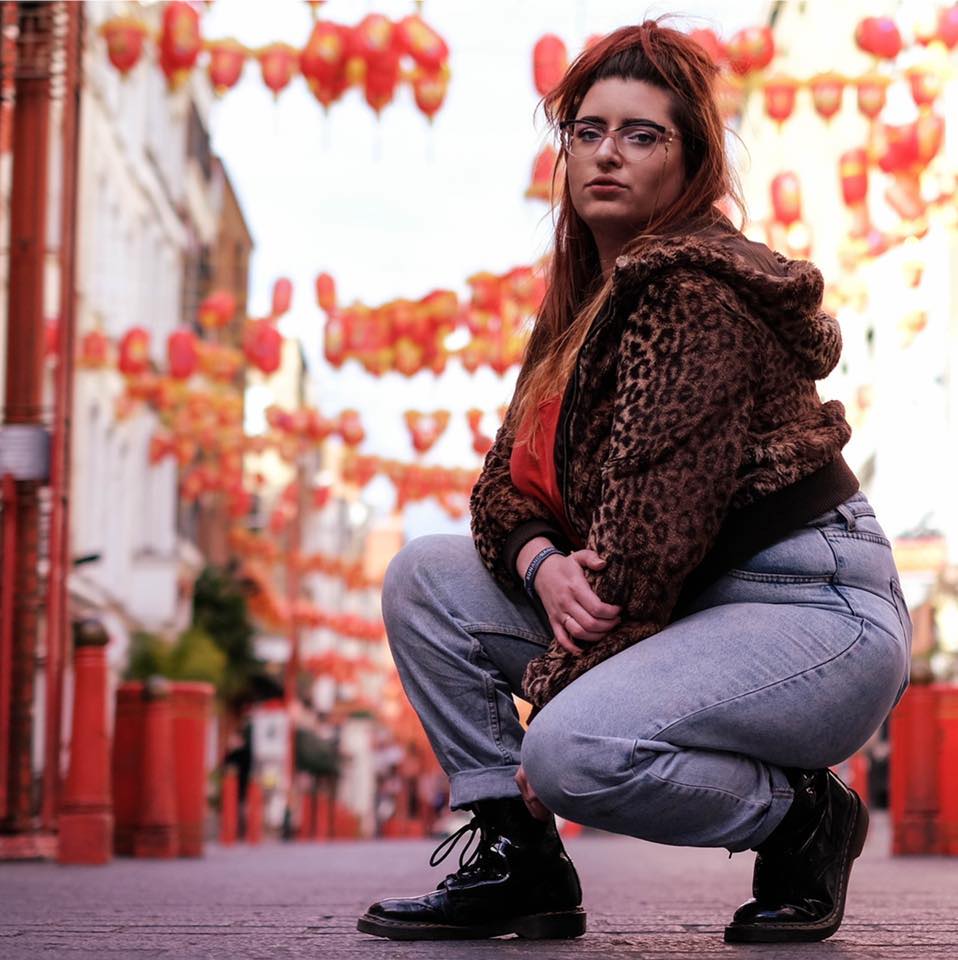Why Has Lockdown Paved The Way For More Female DJs and Producers?


To say the last 12 months have been rough is an understatement. But alongside the barrage of bad news, lockdowns and cancelled festivals, 2020 gave us at least one thing to celebrate - the amount of womxn DJs now killing it on livestreams and online festivals across the world.
And we say across the world for good reason. Because during the making of this article, we’ve been blown away by not only the number of responses we’ve had, but by the fact that they’ve come from literally different corners of the globe. All from womxn on their own unique lockdown musical journeys. And yet all with somewhat similar shared experiences. Through them we’ve found multiple answers to why Lockdown has provided a bigger platform (and space in general) for female artists.
For some womxen, Lockdown has simply given them the time they wouldn’t have had otherwise to get started or perfect their craft. This has been a massive factor for newcomer Magma who has secured three residencies since buying her first controller at the start of Lockdown. ‘I’ve been wanting to start DJing for ages but never found a right time for it, and it’s honestly the best thing I’ve done,’ she told us. She’s since gone on to refine her style through livestreams and is now excited to see what the future holds.
The idea of womxen now having more time is an interesting one as it implies that men must have had more of it on their hands in the first place. But in some ways, you could argue that’s true. Womxn are perhaps expected to juggle so much more in life that they don’t always find time to do the things that make them happy. Something which German DJ Minako also identifies, ‘We now have the time to focus on things like learning something new and challenging ourselves the way males always seem to have time for,’ she says. ‘Not being able to see all of my friends gave me the chance to relax and not try to impress anyone but myself’.
For some womxen, like Polish DJ Bambi Uzi, lockdown has given them space away from demanding day jobs meaning more time to record mixes and learn music production. ‘Maybe this was a sign to use our time for something you couldn’t have done before,’ she comments. And for others it’s even given them the time to reconnect with music in a way that they’d perhaps forgotten.
This is no better exemplified than by Bath-based DJ Tina Irie. Tina Irie has been involved in Jungle and DnB since the earliest days in the 1990s. So much so that she founded the first column dedicated to Jungle in her university’s official newspaper in 1994. But despite reviewing the latest dubs and interviewing big names in the game, she decided to focus on an academic career rather than music. ‘At that time, I lacked the confidence to pursue a career as a DJ/Music Journalist and focused on my academic studies instead - I went on to gain a PhD in History of Art and have been a History of Art teacher and Head of Department for the last twenty years.’
Tina Irie’s love of music was reignited two years ago when she became involved with the birth of the brand-new station, Imperial Voice. Although at this point, she was dropping tunes rather than mixing. ‘I was really concerned that as a White woman on a station formed to empower Black people and minority groups from all backgrounds, I was talking too much - so I was determined to learn how to mix in order to rectify this,’ she told us. Lockdown has given her the time and focus to be able to this and she’s now reaping the rewards.
‘In July, I was given the opportunity to cover a Sunday evening slot on Kane FM which was my first experience of mixing live,’ she says. ‘I’ve also joined Energy 1058, playing live once a month. If you had told me this time last year that I would have my own show on Kane and would be mixing live for two hours at a time, I would have laughed’.


She has now been spending hours in Lockdown listening to music in order to gain a deeper understanding of musical structures and sounds. She's also been catching up on a decade or so of lost musical knowledge to become familiar with new labels as well as the second generation of DJs and producers. Something which she would have been hard pushed to do before.
Tina Irie also touched upon the fact that learning to mix has helped with her mental health which is something a lot of womxen we spoke to echoed, with many believing there’s deeper reasons why womxn are now choosing to take up music.
‘I believe we find peace in music and when we produce and we mix, it gives us a huge sense of achievement. Especially in such a male dominated industry,’ says Manchester-based DJ and performer Jess Rose. ‘Music is finely tuned to our existence. In a spiritual and physical way. We are but vibrations and we flow with other vibrations. I believe people are deeply connected to Music and it can help us get through some struggling times.’
Hemera, an upcoming DJ and producer based in London and Birmingham, supported this idea too. ‘Music gives a sense of excitement and something to look forward to,’ she says. ‘For example, I’m sure that all of the women who started mixing during lockdown are buzzing for what the future holds for when people can finally get bookings and play at events. I think it has brought artists a lot of hope.’
But what about womxen who could already mix before lockdown? Why are more established female DJs also seeing more success right now?
Pinks, a London based Drum & Bass and Jungle DJ and producer, was originally introduced to underground music through London’s free party scene. Although she managed to play out for the first time just before lockdown, her schedule has now exploded thanks to online opportunities.
‘There usually isn’t a week where I don’t have something lined up now, be it a guest mix, a podcast or a livestream.’ Pinks says. She believes the increase in more womxn artists coming through is mainly down to exposure and accessibility.
‘It’s harder to check out an up-and-coming artist when the focus is on live events because that takes up more time and commitment, especially with female artists being less likely to be booked at prime times or in bigger venues.’ Pinks explains.
‘The explosion of livestreaming has given more exposure to smaller artists as a whole. And, because it’s the internet, the reach isn’t limited by location. I played a livestream for the LA based magazine The Lab Mag for example.’ Something which would be unthinkable for smaller artists to do in person as the airfare alone would make them an unbookable prospect.
And social media has opened up these possibilities even more. Cheltenham based DJ MLS, is just one of the DJs that believes the forced push towards social media engagement has been factor. She says, ‘All of us have been forced to take a fully online promotional approach to keep our fan bases engaged due to not performing at events and shows like we usually would.’
Many of the other DJs we spoke to also commented on the power of social media. ‘Social media has brought a lot of talented female artists to the surface who were not as known before. Promoters have noticed them and been keen to add them onto line-ups to create more diversity.’ Hemera states.


Over lockdown, Hemera has performed at a number of high-profile events such as fundraisers for Birmingham’s Lab 11 and Brixton’s Hootananny. Which also brings into question the sheer amount and variety of livestreams on offer to womxen at the moment.
‘These were strange but amazing experiences’ she says. ‘To perform with the speakers and lighting on full blast but with no crowd, was weird but a cool experience and all experiences like that help you grow as an artist. I’m usually so camera shy so these livestreams were good as they helped me get over that. Afterwards, you have professional content to post and promote yourself with which is essential during lockdown when there’s no live events.’
High profile livestreams have also had a positive impact on London-based DnB DJ CHARLO. I think virtual events have played an incremental part in where I am with my DJing today’, she says. ‘It’s a great opportunity to ‘play’ to people other than yourself during this weird time and I truly believe livestreams have brought about an even stronger sense of community within the scene. Notable virtual events such as Stay at Home Festival by Goat Shed and Onyx Recordings really helped me get my name out there to people who may not have known me otherwise, I’m so grateful for the amazing opportunities I get to play alongside some huge names that I look up to and inspired me to start DJing in the first place! The proof really is in the pudding as playing virtual events got me noticed by my booking agent and got me signed to an agency”.


The sense of community CHARLO touches upon is something a lot of other artists highlighted too. We were told how the pandemic has given womxn an opportunity to network with other people in the industry in a way that they’ve not been able to before.
‘I think the biggest thing I’ve benefited from is that I have met lots of other amazing DJs, promoters and other professionals in the industry who have then booked me for their shows after seeing me perform,’ says MLS.
‘Myself and a lot of the female artists I know have created a network between us where we are all pushing and encouraging each other. Whether that be by commenting on posts or streams, sharing and liking content or even just being there when times are tough and having a chat. I’ve truly made so many new friends some of who I’ve not even met before in person and it’s so great to see other women feel this way too.’
This is something that has had a massive impact on London-based up-and-comer Sabrina who started her mixing and producing journey in lockdown. ‘When I see girls supporting each other, it just motivates me to keep pushing myself,’ she says. ‘Social media has enabled girls to feel ‘braver’ to push themselves out there more, hence why I think line-ups are becoming more equal, because there are endless number of talented gals in the scene!’
Something which is echoed by up-and-coming DJ Yours Truly. She told us how lockdown has enabled her to go from being a bedroom DJ to having five different residencies. She thinks the increase of more female artists coming through is down to the support network social media provides. ‘You'd hear of female artists in the scene but they weren’t given the attention they deserved before lockdown,’ she told us. ‘Once other girls see them on screen, they realize that there’s a bigger army of us than once thought and it gives a huge amount of encouragement. I’ve made so many friends through this lockdown that are other female artists and honestly, we’re like a little family. The support bubble that we have is unbreakable. I know we’ll hold onto that once this starts to change. We’ve already had these conversations together and our plans are massive. It’s great.


As well as promoters having their eyes opened to new acts, artists are also having their eyes opened to new types of livestreaming opportunities. For example, Pinks spoke passionately about her involvement in What's Going on in Your Head, a mental health awareness livestream which involved lots of different performances including poetry, comedy and live music surrounding the theme of kindness.
And Jess Rose recognised how lockdown has provided opportunities to break down barriers through diverse virtual events. She’s been able to using her platform to both promote herself as an artist and advocate for Trans rights.
‘I was part of the Salford pride virtual event which has raised awareness for LGBT+ people and was good visibility for me,’ she says. ‘I’m also part of a group at Partisan collective called Queer Family Tea who are a community group focused on creating a safe space and putting on activities and workshops for all sorts of things from Djing and dancing to making art. I’ll also be doing a set for LGBT+ month and a set for world NGO day on the 27th Feb’.
Dj Natty Lou also gave us an insight into how livestreams have helped her learn from the pros. ‘Live-streams have also given me the opportunity to learn from other DJs from all over the world – big and small,’ she explains. ‘For example, I learnt a lot from watching Andy C and A.M.C’s live-streams. It gave me an opportunity to really watch their DJing techniques close-up and learn what they were doing – this isn’t possible in a club!’
Having working abroad for the last five years as a professional dancer and choreographer, Natty Lou moved back to the UK due to the pandemic. It was this that motivated her to buy her first controller. She says, ‘I started learning to mix in 2018, but due to my inconsistent work schedule (flying all over Asia and on tour dancing with artists for long periods of time), I did not have the time to really sit down, develop my skills and focus on creating mixes.’ She is now a resident for a number of labels and played out at Shutdown Bristol's sit-down rave at Lakota Gardens last year.
Although the increasing number of womxn on lineups is clear to see, there was a small divide amongst the artists we spoke to when asked about the reasons for this. Some, like DJ and producer Dalemma, thought that promoters are keen to support equality, ‘I think a lot of them are trying to diversify the scene and include more women, which is great to see,’ she comments.
CHARLO also believes promoters have woken up to the wealth of female talent out there. She says, ‘I think promoters have made much more of a conscious effort to book womxn for online line-ups as with everything and everyone being online now, it’s hard to ignore the amount of ridiculously talented gals out there. They’re making lots of noise in the scene and the virtual reach they have is impressive. I’m a strong advocate of booking people based upon their talent and not their gender so I think lockdown has been a huge wake up call to a lot of promoters.’
But a few others thought there could be a couple of less than positive reasons. ‘To be completely honest, I think it’s partially due to the fact some promoters feel pressured to do it as there is a lot of talk about having a 50/50 lineup and they have seen other brands criticised for it’, says MLS. And both Bambi Uzi and Swiss DJ switch/case commented on the fact that some promoters may be motivated by the fact that womxen get more views and more (not always positive) comments. Although switch/case was keen to put a positive spin on this saying, ‘even if this might be the case of some bookings, I see it as a chance for us women to show that we also know what we are doing and prove them wrong.’
It was interesting to speak to artists from other countries as it highlighted perhaps how much progress has been made here in the UK compared to other places where female representation in the scene is still relatively small.
Karolin Koppel is one of the organisers of the Liquicity Community Streaming events. She told us that she will continue to include more womxen on her line-ups but it’s not always easy as the number of female DJ's locally is unfortunately very low. Something she hopes will change soon. Thankfully, the reaction to her push to include more womxen has been positive. She told us, ‘It was honestly amazing to see how excited everyone was to see female representation in the lineup, and it definitely reflected in the amount of engagement in Twitch and Discord chats during their sets. The audience was genuinely excited to see these amazing women put together such high-quality sets’.
Swiss DJ switch/case is one of the womxn that was booked to play by Karolin. Despite winning competitions that have led to her supporting Noisia and playing at Liquicity in 2019, switch/case still found it difficult to get gigs before lockdown due to the cliquey nature of the scene where she lives. But a wave of younger promoters is now trying to change things and she was able to play to what was probably her biggest crowd yet at the Liquicity event in December. She noted how Lockdown has given womxen more female role models to look up to and importantly, more confidence. She says, ‘The lack of courage and confidence is deeply rooted in so many women I’ve met and we tend to be our hardest critics. Initially these fears were also my biggest enemy. Over time I noticed that many men aren’t necessarily more talented but they just don’t question their skill and confidence as much as I do. It’s very likely that many women now have this realisation a lot sooner because there are more role models.’
Being able to perform live from the comfort of their homes and instant positive feedback were other reasons given for the growing confidence amongst female artists. “I have been given so much positive feedback from people on Instagram the first few times I decided to do a live stream” says Miami-based DJ Meaux Andromeda. “It helped me with my self-esteem immensely. Before I was so nervous about what people would think If I didn’t mix the records on point that I realize the more I went on live the more people just wanted to hear the music I was playing and I stop caring about “what if I mess up.” Those streams got me a small vinyl gig in Miami, an exclusive blog mix submission coming soon sometime in February’.
And finally. It's worth noting that not everyone we spoke to necessarily saw an immediate connection with lockdown and the fact we’re seeing more females on line-ups. Aras, a DJ from Vienna who runs ‘Sunday Sessions’ a monthly mix series with fellow female DJ/producer Sequent, agrees that Lockdown has made it easier for womxn to promote themselves, but thinks we’re seeing an extension of something that has been brewing for a while. ‘I think there has been a positive movement for women over the past few years in general already,’ she says. ‘It feels like 2020 was kind of the year were more people stepped forward, spoke up and finally started to include more women.’
But whether the wave of female artists coming through is down to time, confidence, exposure, accessibility or simply a natural progression, we can all agree it’s something we want to see continued into live events when they resume. In the words of Yours Truly, ‘We need to stick together as a community, celebrate each other and really show that this is for life, not just for a lockdown hobby’.
Words: Emma Rochford

